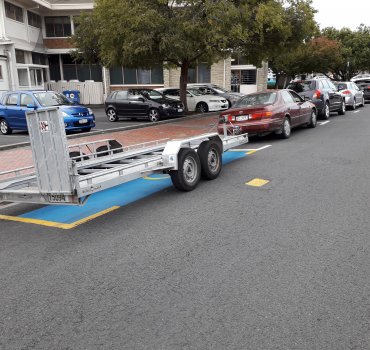

Drivers who ignore mobility signs are upsetting other drivers – and risking a fine.
Heather Brand is frustrated by the continuing abuse of Cambridge’s mobility parking spaces.
She has Parkinson’s Disease and her condition leaves her unable to walk at times, and she must park close to shops as a consequence.
“Sometimes I need to give myself a dose of medication that’s absorbed rapidly and enables me to get back to my car, so my park needs to be close to where I’m going,” she said.
Heather visits town most weekdays and sees able-bodied drivers misusing the parks “about once every second day”.
“Sometimes we just can’t get in to do our jobs and shopping and things like that, so we just go home again,” she said.
She lists repeat offenders as food delivery companies, courier drivers and people towing trailers.
“Guys just park and when you say to them, this is a disability park, they say oh I’m just going to do deliveries, I’ll be five minutes.”
Cambridge man Aaron Ure, who has spine and nervous system issues following a workplace injury, shares Heather’s frustrations.
Aaron visits town about once a week and can’t find a mobility park about half the time because able-bodied drivers are using them.
On “a bad day”, just walking the length of Victoria St using his walking frame or crutches can be “really exhausting and painful” for him.
“Some days that block can be the longest thing you’ve ever done if you’re tired and sore,” he said. “I’m only 57 – I’m young – but I think of some of the older folk; it’s so exhausting for me, for you it must just seem like an endless street with nowhere to park and nowhere to sit.”
CCS Disability Action central region access coordinator Raewyn Hailes said the abuse of mobility parking spaces was “a massive problem” across New Zealand.
Her organisation previously lobbied successfully to have the fine for misusing mobility parks raised from $40 to $150, but saw no change in driver behaviour.
It has developed an app, Access Aware, that allows users to report mobility park abuse to councils in live time. Statistics gathered will be used to lobby the Government on legislative change to make penalties more severe.
The organisation would like to roll the app out nationwide and is keen to talk to Waipa District Council about introducing it here.
Waipa District Council’s road corridor manager Bryan Hudson said council had issued 13 infringement notices since 1 January 2018 to those caught using mobility parks without a permit.
“The level of parking fines would suggest to us that abuse of mobility car parks is not wide spread,” he said.
“That’s not to say it doesn’t happen – it’s just not reflected in the statistics.”
He encouraged residents to report mobility park abuse by taking a photo or jotting down the vehicle’s registration and the time and calling council immediately. “We are more than happy to take enforcement action if we know about it.”
Council is preparing a long-term parking strategy and is working with the Chamber of Commerce and other stakeholders on this.
In Cambridge, 1000 people hold mobility parking permits. The permits must be displayed on their vehicle’s dashboard or hung from the rear view mirror.








